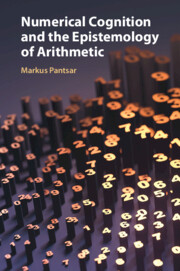Book contents
- Numerical Cognition and the Epistemology of Arithmetic
- Numerical Cognition and the Epistemology of Arithmetic
- Copyright page
- Contents
- Figures
- Preface
- Introduction
- Part I Ontogeny
- Part II Phylogeny and History
- Chapter 4 The Phylogeny and Cultural History of Number Concepts
- Chapter 5 The Development of Arithmetic
- Chapter 6 Cumulative Cultural Evolution
- Part III Epistemology and Ontology
- Conclusion
- Bibliography
- Index
Chapter 5 - The Development of Arithmetic
from Part II - Phylogeny and History
Published online by Cambridge University Press: 15 March 2024
- Numerical Cognition and the Epistemology of Arithmetic
- Numerical Cognition and the Epistemology of Arithmetic
- Copyright page
- Contents
- Figures
- Preface
- Introduction
- Part I Ontogeny
- Part II Phylogeny and History
- Chapter 4 The Phylogeny and Cultural History of Number Concepts
- Chapter 5 The Development of Arithmetic
- Chapter 6 Cumulative Cultural Evolution
- Part III Epistemology and Ontology
- Conclusion
- Bibliography
- Index
Summary
In Chapter 5, the focus is on the development of arithmetical operations. I review empirical literature and argue that addition has plausibly developed as a direct continuation of counting procedures, which in turn made it possible to develop other arithmetical operations (multiplication, subtraction, and division). After that, reviewing literature on different cultures, I show the importance of arithmetical applications for the development of arithmetic – or the lack of it. While arithmetical operations have developed in similar ways in different cultures (when arithmetic was indeed developed), in the final section I show how some aspects of Western arithmetic – for example, proofs, axiomatisations and infinity – are more culturally specific.
Keywords
Information
- Type
- Chapter
- Information
- Numerical Cognition and the Epistemology of Arithmetic , pp. 115 - 137Publisher: Cambridge University PressPrint publication year: 2024
